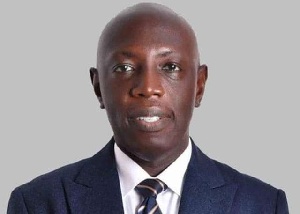- Home - News
- Elections 2024
- News Archive
- Crime & Punishment
- Politics
- Regional
- Editorial
- Health
- Ghanaians Abroad
- Tabloid
- Africa
- Religion
- Photo Archives
- Press Release
General News of Thursday, 22 May 2025
Source: www.ghanawebbers.com
Full Text: Isaac Adongo’s statement on economic stability under Mahama’s reset agenda
On Wednesday, May 21, Dr. Mohammed Amin Adam made a statement. He is the former Finance Minister and Ranking Member of the Finance Committee. He claimed credit for Ghana's current macroeconomic stability. This aligns with his party, the NPP, and their 2024 Flagbearer, Dr. Muhamudu Bawumia. Dr. Amin stated that gold reserves built before December 2024 are stabilizing the currency and inflation.
Earlier, Dr. Bawumia made similar claims. He often tries to take credit for positive outcomes while distancing himself from negative ones. For example, he abandoned policies from the Akufo-Addo-led government earlier this year but still claims credit for digital projects.
Two key questions arise for Dr. Bawumia and Dr. Amin: Why was the cedi around GHS17 to one US dollar in 2024? This was when they had strong gold reserves as part of their economic management team. Also, what has changed regarding external factors like the ongoing Russia-Ukraine war?
Their attempts to associate with positive outcomes seem disingenuous and unsupported by facts.
Macroeconomic stability results from multiple factors, not just reserves. Current positive indicators stem from prudent fiscal management by the Ministry of Finance and strict monetary policy by the Bank of Ghana. While international reserves play a role, they are part of a broader economic strategy.
The cedi's stability reflects President Mahama’s commitment to fiscal discipline and effective monetary policy implementation. The Bank of Ghana has played a crucial role through interest rate decisions and liquidity management strategies.
The GoldBod program supports currency management using Ghana's natural resources effectively.
Declining inflation rates show our anti-inflation measures are working gradually. These measures include tightening monetary policy and addressing food supply chain issues.
Investor confidence in President Mahama’s leadership has increased funding in the economy compared to previous administrations that saw high divestments.
Interest rates are responding positively to improved economic fundamentals now creating a better environment for business growth.
Reduced government domestic borrowing has eased crowding-out effects on private sector credit access since President Mahama took office on January 7, 2025.
Fiscal consolidation efforts have reduced reliance on domestic borrowing while enhancing transparency and discipline in financial management.
International media previously accused the government of shady borrowing practices in 2024; these issues have been resolved under current leadership.
Ghana's traditional export sectors like gold and cocoa have shown resilience and growth due to favorable global prices and improved yields.
The GoldBod initiative has also helped curb gold smuggling, increasing formal exports and foreign exchange inflows supporting cedi stability.
The Bank of Ghana has improved transparency in its foreign exchange operations through regular data publications and clear communication with market participants.
These actions have reduced uncertainty in forex markets contributing to more orderly trading conditions.
Following prudent economic management, organizations like the IMF and World Bank recognize Ghana's progress in managing its economy effectively.
On May 9, S&P Global Ratings upgraded Ghana’s sovereign credit ratings from junk status due to growing confidence in its economic trajectory under current leadership.
This upgrade reduces risk premiums on government treasuries leading to lower borrowing costs benefiting the broader economy overall.
As a result of these efforts, we see unprecedented cedi stability alongside normalization of yield curves helping sustain disinflation trends benefiting ordinary Ghanaians as promised during President Mahama’s campaign.
In conclusion, while I don't expect praise from the NPP for this government’s achievements, it is unreasonable for them to claim credit for success now evident across various indices despite their past failures linked solely external factors like COVID-19 or geopolitical tensions which remain unchanged today yet show improvement under new leadership focused on delivering promises made directly towards citizens’ welfare without distractions caused by previous records marked by high taxes or inflation rates.











